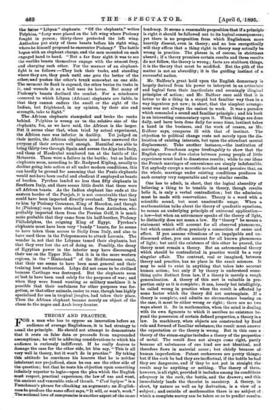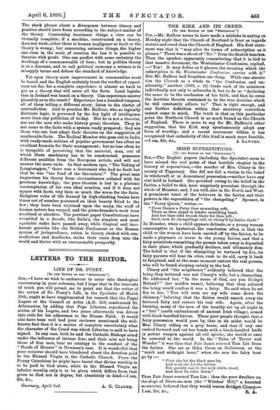THEORY AND PRACTICE.
FOR a man who has to oppose an innovation before an audience of average Englishmen, it is bad strategy to assail the principle. He should not attempt to demonstrate that it rests on false data or proceeds from ungrounded assumptions; he will be adducing considerations to which his audience is curiously indifferent. If he really desires to damage the ease for the other side, let him say, "This is all very well in theory, but it won't do in practice." By taking this attitude he convinces his hearers that he is neither intolerant nor prejudiced, since he can see the other side of the question ; but that he rests his objection upon something infinitely superior to logic—upon the plea which the English most respect, practical experience, the law of use and wont, the ancient and venerable rule of thumb. " C'est logique" is a Fitenehman's phrase for clinching an argument; an E aglish- mate& produce the same effect says, "It will, or won't, work." The national love of.00mproatise is-another aspect of the same
tendency. It seems a reasonable proposition that if a principle is right it should be followed out to its logical consequences; yet there is no proposition from which Englishmen more heartily dissent, even in theory; and no less energetically will they affirm that a thing right in theory may actually be wrong in practice. The phrase is, of course, in strictness absurd ; if a theory promises certain results and these results do not follow, the theory is wrong ; facts are stubborn things, it is the theory that must be modified. But the pith of the matter is not an absurdity; it is the guiding instinct of a, successful nation.
Mr. Balfour's great hold upon the English democracy is largely derived from his power to interpret in an articulate and logical form their inarticulate and seemingly illogical principles of action; and Mr. Balfour once said that it is better to do a thing in a stupid but familiar way than in a way ingenious yet new ; in short, that the simplest arrange- ment was not always the easiest to work. It was a paradox which concealed a sound and familiar principle ; and his book is an interesting commentary upon it. When things are done daily, and have been done daily for some time, instinct takes a hand in the business, and the work of reason, as Mr. Balfour says, compares ill with that of instinct. The objection to political change rests not merely upon the dis- location of existing interests, but upon the attendant mental displacement. Take another instance,—the institution of marriage. Frenchmen argue irrefragably to show that the English system of free choice between young people of little experience must lead to disastrous results; while to our ideas the French marriages of convenience are simply indefensible. Yet anybody except a neurotic novelist must perceive that, on the whole, marriage under existing conditions produces in each country very respectable and very similar results.
One has to admit, in short, that the logical absurdity of believing a thing to be tenable in theory, though results belie it, is only a verbal contradiction ; but the admission must be made with reservations. Theory is a word with a scientific sound, but most unscientific usage. When a mathematician talks about the theory of quadratic equations, he means an underlying principle of universal application— a law—but when an astronomer speaks of the theory of light, he distinctly does not mean, a law. By "theory" he means a statement which will account for all observed phenomena, but which cannot affirm precisely a connection of cause and effect. If you assume vibrations of an impalpable and un- discerned ether, you can account for all known phenomena of light ; but until the existence of this ether be proved, the theory must remain a theory. But an astronomical theory which should be contradicted in practice would be a very singular affair. The contrast, real or imagined, between theory and practice, has no place in the exact sciences. It may be said to exist in anything that takes into account human action; but only if by theory is understood some- thing quite distinct from law, if a theory is merely a rough generalisation. A theory of this sort is valuable in pro- portion only as it is complete ; it can, loosely but intelligibly, be called wrong in practice when the result is affected by some factor which the theory did not contemplate. If a theory is complete, and admits no circumstance bearing on the case, it must be either wrong or right ; there are no two ways about it. So in mathematics, when the mind is dealing with its own figments to which it ascribes no existence be- yond the possession of certain defined properties, a theory is a law. In machinery, when objects are constructed by fixed rule and formed of familiar substance, the result must answer the expectation or the theory is wrong. But in this case a theory of the steam-engine includes a theory of the properties of metal. The result does not always come right, partly because all substances of one kind are not identical, and therefore flaws in material occur ; but chiefly because of human imperfection. Patent corkscrews are pretty things; but if the cork be bad they are ineffectual, if the bottle be bad they are dangerous, and if they be not put in straight the result may be anything or nothing. The theory of them, however, is all right, provided it includes among its conditions adequacy in the cork, the bottle, and the drawer ; and this immediately lands the theorist in casuistry. A theory, in short, by nature as well as by derivation, is a view of a subject ; and outside of mathematics there is no subject of which a complete survey can be taken so as to predict results. The stock phrase about a divergence between theory and practice should have force according to the subject-matter of the theory. Concerning inanimate things a view can be virtually complete; if a machine, constructed on a theory, ,does not work, either there is human negligence at fault or the theory is wrong ; but concerning animate things, the higher one rises in the scale of creation the less it is possible to theorise with profit. One can predict with some certainty the workings of a commonwealth of bees ; but in politics theory is at a discount, and to call political economy a science is to misapply terms and debase the standard of knowledge.
Yet upon theory most improvement in communities must be based, and the English certainly trust the verdict of experi- ence too far, for a complete experience is almost as hard to get as a theory that will cover all the facts. Land legisla- tion in Ireland was based on a theory. Can experience answer plausibly as to the result? Experience has a hundred tongues, all of them telling a different story; listen to the clatter of contradiction. And in practice Mr. Balfour, who so logically distrusts logic, is governed by the dry light of intelligence more than any politician of to-day. But he is not a theorist, nor are the men who make history great, theorists. They do not come to the facts with a system ready prepared; they are those who can best adapt their theories on the suggestion of unalterable facts. The Radical Member who goes out to India with ready-made notions of popular government has often an excellent formula for State management ; but no less often he is incapable of perceiving that the material, man, out of which State machinery has to be constructed, possesses different qualities from the European article, and will not answer the same ends. In that modern epic, "The Taking of Lungtungpen," there was a lieutenant who had no fault but that he was "too fond of the theourisin'." The great man improvises his theory from circumstances collated with his previous knowledge; the pure theorist is lost in a platonic contemplation of his own ideal creation, and if it does not square with facts, why then so much the worse for the facts. Religious rules of life framed by high-thinking brains have times out of number possessed an ideal beauty fitted to the few; they have been enjoined upon the many, the stuff of human nature has warped, and the pious founder's work been sterilised or abortive. The prettiest paper Constitutions have crumbled in a decade, like Sulla's, the simplest and most equitable codes have passed away, while illogical and inco- herent growths like the British Parliament or the Roman system of jurisprudence, rotten in theory, choked with con- tradictions and deadlocks, strike their roots deep into the world and thrive with an unreasonable prosperity.







































 Previous page
Previous page